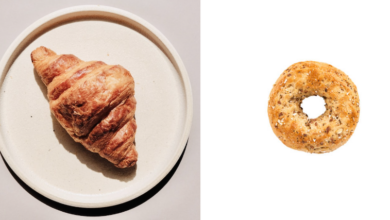Croissant Vs. Whole Wheat Bread: Which One is Better for You?

What To Know
- Join us as we delve into the depths of the croissant vs whole wheat bread debate, exploring their nutritional profiles, taste experiences, and the art of pairing them with various accompaniments.
- Croissants fall short in the protein department, offering a mere 3 grams per serving, while whole wheat bread boasts a more substantial 5 grams.
- Its rich flavor profile, a harmonious blend of butter, sugar, and a hint of salt, makes it a delectable treat.
In the realm of breakfast and baking, two culinary titans stand tall: the flaky, buttery croissant and the wholesome, hearty whole wheat bread. Both have their passionate advocates and distinct characteristics, making them worthy contenders in the battle for breakfast supremacy. Join us as we delve into the depths of the croissant vs whole wheat bread debate, exploring their nutritional profiles, taste experiences, and the art of pairing them with various accompaniments.
Nutritional Showdown: Croissant vs Whole Wheat Bread
When comparing the nutritional composition of croissants and whole wheat bread, several key differences emerge.
- Calories: Croissants pack a higher caloric punch, averaging around 270 calories per serving compared to whole wheat bread’s 160 calories. This disparity is primarily due to the croissant’s generous helping of butter and sugar.
- Fat Content: Croissants contain significantly more fat than whole wheat bread, with approximately 13 grams per serving versus 1.9 grams. The majority of this fat in croissants is saturated fat, which can raise LDL cholesterol levels if consumed in excess.
- Carbohydrates: Both croissants and whole wheat bread are rich in carbohydrates, providing around 30 grams per serving. However, whole wheat bread contains more complex carbohydrates and fiber, which contribute to a feeling of fullness and promote digestive health.
- Protein: Croissants fall short in the protein department, offering a mere 3 grams per serving, while whole wheat bread boasts a more substantial 5 grams. Protein is essential for muscle growth, repair, and overall satiety.
- Fiber: Whole wheat bread triumphs in the fiber category, delivering a hefty 4 grams per serving compared to the croissant’s meager 0.5 grams. Fiber is crucial for digestive regularity, blood sugar control, and maintaining a healthy weight.
Taste and Texture: A Tale of Two Breads
The croissant and whole wheat bread offer vastly different sensory experiences.
- Croissant: The croissant’s defining characteristic is its flaky, buttery layers that yield a crispy exterior and a soft, airy interior. Its rich flavor profile, a harmonious blend of butter, sugar, and a hint of salt, makes it a delectable treat.
- Whole Wheat Bread: Whole wheat bread, on the other hand, is denser and chewier than its croissant counterpart. Its earthy, nutty flavor is derived from the whole wheat flour, which retains the bran and germ of the wheat kernel. This wholesome taste is often complemented by the addition of seeds, nuts, or dried fruits.
Pairing Possibilities: The Perfect Accompaniments
Both croissants and whole wheat bread shine when paired with various accompaniments, transforming them into culinary masterpieces.
- Croissant: Croissants are the ideal companions for sweet and savory fillings alike. They can be filled with jams, chocolate spreads, cheese, or ham and eggs, creating a delightful balance of flavors and textures.
- Whole Wheat Bread: Whole wheat bread serves as a versatile base for sandwiches, toast, and open-faced creations. Its hearty texture stands up well to robust ingredients like grilled vegetables, lean proteins, and flavorful spreads.
Health Implications: Which Bread Reigns Supreme?
When it comes to overall healthfulness, whole wheat bread emerges as the clear winner.
- Heart Health: Whole wheat bread’s high fiber content promotes heart health by lowering LDL cholesterol levels and reducing the risk of heart disease.
- Blood Sugar Control: The complex carbohydrates in whole wheat bread help regulate blood sugar levels, making it a suitable choice for individuals with type 2 diabetes or prediabetes.
- Digestive Health: The fiber in whole wheat bread aids in digestion, preventing constipation and promoting regularity.
Environmental Impact: Considering Sustainability
Croissants and whole wheat bread have differing environmental impacts, primarily due to the ingredients and production processes involved.
- Croissant: Croissants require more energy and resources to produce, as they are made with refined flour, butter, and sugar. Additionally, the intensive layering and baking process contribute to higher carbon emissions.
- Whole Wheat Bread: Whole wheat bread has a lower environmental impact due to its use of whole wheat flour, which requires less processing and energy to produce. Its simpler production process also results in reduced carbon emissions.
The Verdict: A Matter of Personal Preference and Occasion
Ultimately, the choice between croissants and whole wheat bread boils down to personal preference and the occasion. Croissants offer a decadent indulgence, perfect for special occasions or as a sweet treat. Whole wheat bread, on the other hand, is the healthier choice for everyday consumption, providing sustained energy and numerous health benefits.
Beyond the Binary: Exploring Other Bread Options
While croissants and whole wheat bread are popular choices, there’s a vast world of other bread varieties to explore.
- Sourdough Bread: Sourdough bread is made with a fermented starter, resulting in a tangy, slightly sour flavor. It is known for its long shelf life and gut-friendly properties.
- Rye Bread: Rye bread is made from rye flour, giving it a dense, slightly bitter taste. It is rich in fiber and has a lower glycemic index than wheat bread.
- Multigrain Bread: Multigrain bread combines different types of grains and seeds, offering a variety of textures and flavors. It is a good source of fiber, vitamins, and minerals.
- Ezekiel Bread: Ezekiel bread is made from sprouted grains and legumes, resulting in a high protein and fiber content. It is a nutrient-dense bread option with a slightly sweet flavor.
What You Need to Know
1. Q: Can I eat croissants as part of a healthy diet?
A: While croissants can be enjoyed occasionally, they should be consumed in moderation due to their high fat and calorie content. Opting for whole wheat croissants or filling them with healthier options like fruit or lean protein can make them a more balanced choice.
2. Q: Is whole wheat bread always the healthier option?
A: While whole wheat bread is generally healthier than white bread, it’s important to consider the specific ingredients and processing methods used. Some whole wheat breads may contain added sugars or preservatives that can negate their health benefits.
3. Q: How can I make croissants healthier?
A: To make croissants healthier, you can use whole wheat flour instead of refined flour, reduce the amount of butter and sugar, and fill them with nutritious ingredients like fruits, vegetables, or lean proteins.
4. Q: Can I make whole wheat bread at home?
A: Yes, you can make whole wheat bread at home using simple ingredients and a bread machine or oven. There are numerous recipes available online or in cookbooks that provide step-by-step instructions.
5. Q: Which bread is better for weight loss, croissants or whole wheat bread?
A: Whole wheat bread is a better choice for weight loss as it is lower in calories, fat, and carbohydrates than croissants. Additionally, the fiber in whole wheat bread promotes satiety and helps control appetite.





